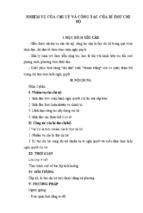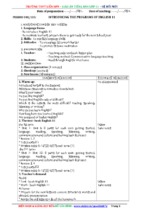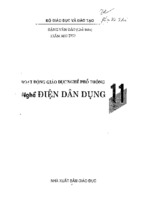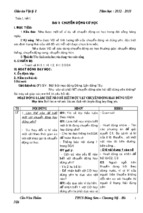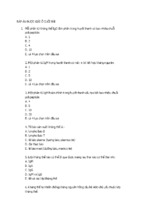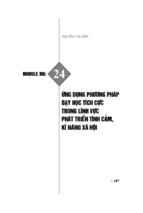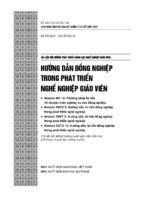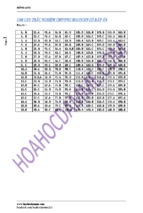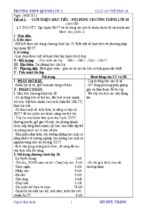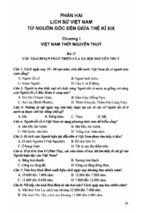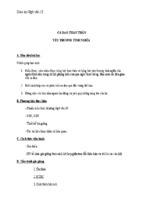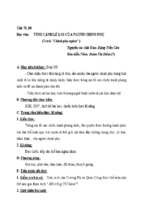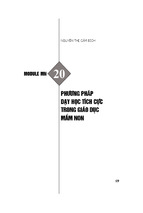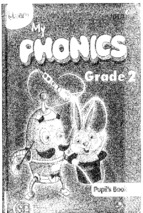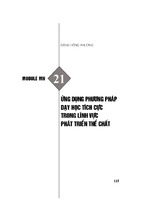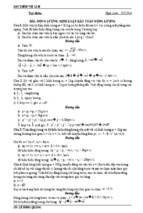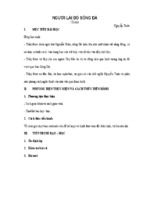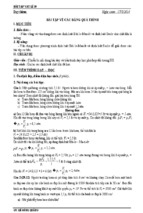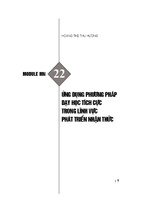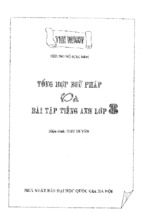TRƯỜNG THPT LIẾN SƠN www.thptlienson.edu.vn – TỔ NGOẠI NGỮ - GIÁO ÁN ÔN THI TNTHPT TIẾNG ANH 2011-2012
PHẦN I – STRESS – TRỌNG ÂM
RULES TO MARK STRESS – QUI TẮC ĐÁNH TRỌNG ÂM
TIẾT 1
Ngày soạn:
/
/
Ngày giảng:
/
/
I.
Definitions:
1. Phoneme: The smallest part of sound (vowel and consonant sounds) Âm tố - là thành phần nhỏ nhất của âm
thanh (gồm nguyên âm và phụ âm)
2. Syllable: The sound made when one or clusters of phoneme are articulated. Âm tiết – là tiếng phát ra khi một
hoặc nhiều âm tố được phát âm.
3. Stress: The degree of the loudness or prominence with which a sound ort a word is pronounced. Độ
lớn hay thống trị về âm của một âm tiết khi một chùm âm của một từ (có từ hai âm tiết trở lên) được
đọc, nói hay phát âm.
II.
Rules to mark stress:
1. Di-syllable words:
a. Usually on the second syllable if it is a verb whose second syllable doesn’t contain the vowel sounds of /ә/, /I/,
and /әu/, on the first syllable of the other words. (trọng âm thường rơi vào âm tiết thứ 2 đối với động từ - trừ
các âm tiết thứ 2 chứa nguyên âm /ә/, /I/, hoặc /әu/, rơi vào âm tiết thứ nhất đối với các từ loại còn lại). As:
mother, ready, color, palace, student, teacher, tonight, afraid, people, money, enjoy, paper, begin, provide,
summer, abroad, noisy, success, enter,…
b. Usually on the root syllables with words having suffixes or prefixes(đối với những từ có mang tiền tố, hậu tố,
trọng âm thường rơi vào âm tiết gốc). As: become, react, foretell, unpleasant, begin, failure, threaten, daily,
treatment, ruler, unknown, builder, lately, quickly,…
c. Be careful with words with different word-class. (đối với những từ mà bản thân có nhiều chức năng từ vựng ta
áp dụng qui tắc a). As
Verb
Other words
Verb
Other words
Verb
Other words
rebel
record
record
conflict
conflict
rebel
progress
progress
export
export
permit
permit
suspect
suspect
conduct
conduct
1.
2.
3.
4.
5.
6.
7.
8.
9.
10.
11.
12.
13.
14.
15.
16.
17.
18.
19.
20.
PRACTICE EXERCISE 1 - BÀI TẬP THỰC HÀNH 1
Find the one whose stress pattern is different from the others of the same group.
A. paper
C. lecture
D. story
B. tonight
A. money
B. army
C. afraid
D. people
A. enjoy
B. daughter
C. provide
D. decide
A. begin
B. pastime
C. finish
D. summer
A. abroad
B. noisy
C. hundred
D. quiet
A. passion
B. aspect
C. medium
D. success
A. exist
B. evolve
C. enjoy
D. enter
A. doctor
B. modern
C. corner
D. Chinese
A. complain
B. machine
C. music
D. instead
A. writer
B. baker
C. builder
D. career
A. provide
B. adopt
C. happen
D. inspire
A. result
B. region
C. river
D. robot
A. constant
B. basic
C. irate
D. obvious
A. become
B. carry
C. appoint
D. invent
A. engine
B. battle
C. career
D. rabies
A. attract
B. destroy
C. level
D. occur
A. spaceship
B. planet
C. solar
D. surround
A. brilliant
B. daily
C. extreme
D. protein
A. appoint
B. gather
C. threaten
D. vanish
A. button
B. canal
C. failure
D. monster
CREATED BY DO QUOC BINH – TEACHER OF ENGLISH
-
[email protected]/
[email protected]
TRƯỜNG THPT LIẾN SƠN www.thptlienson.edu.vn – TỔ NGOẠI NGỮ - GIÁO ÁN ÔN THI TNTHPT TIẾNG ANH 2011-2012
TIẾT 2
RULES TO MARK STRESS – QUI TẮC ĐÁNH TRỌNG ÂM
Ngày soạn:
/
/
Ngày giảng:
/
/
2. Words with more than two syllable:
a. Usually on the 3rd syllables from the end (trọng âm thường rơi vào âm tiết thư ba kể từ âm tiết cuối): As. family,
cinema, regular, singular, international, satisfactory, recognize, demonstrate, qualify, psychology, biologist,
biology, democracy, responsibility…
b. Usually on the 2nd syllables from the end with words ending in “ian”, “ic”, “ience”, “ient”, “al”, “ial”, “ual”,
“eous”, “ious”, “iar”, “ion”(đối với các từ có tận cùng như đã liệt kê, trọng âm thường rơi vào âm tiết liền
trước của các tận cùng này – thứ 2 kể từ âm tiết cuối). As: physician, experience, expedient, parental, essential,
habitual, courageous, delicious, familiar,…
(Except for: Television)
c. Usually on the suffixes “ese”, “ee’, “eer”, “ier”, “ette”, “oo”, “esque” (đối với các từ có tận cùng như liệt kê,
trọng âm thường rơi vào chính các âm tiết chứa các tận cùng này). As: Portuguese, refugee, employee,
engineer, volunteer, adequate, picturesque, cigarette,…
1.
2.
3.
4.
5.
6.
7.
8.
9.
10.
11.
12.
13.
14.
15.
16.
17.
18.
19.
20.
Notes:
PRACTICE EXERCISE 2 - BÀI TẬP THỰC HÀNH 2
Find the one whose stress pattern is different from the others of the same group.
A. interesting
B. surprising
C. amusing
D. successful
A. understand
B. engineer
C. benefit
D. Vietnamese
A. aP.Plicant
B. uniform
C. yesterday
D. employment
A. dangerous
B. parachute
C. popular
D. magazine
A. beautifully
B. intelligent
C. redundancy
D. discovery
A. comfortable
B. employment
C. important
D. surprising
A. variety
B. irrational
C. industrial
D. characterize
A. colorful
B. equality
C. dictionary
D. vegetable
A. elegant
B. regional
C. musical
D. important
A. difference
B. suburban
C. internet
D. character
A. beautiful
B. effective
C. favorite
D. popular
A. attraction
B. government
C. borrowing
D. visit
A. difficulty
B. individual
C. population
D. unemployment
A. biology
B. redundancy
C. interviewer
D. comparative
A. conversation
B. isolation
C. traditional
D. situation
A. capital
B. tradition
C. different
D. opera
A. inventor
B. physicist
C. president
D. gardener
A. biology
B. interviewer
C. redundancy
D. America
A. encourage
B. consider
C. constitute
D. inhabit
A. industry
B. holiday
C. adventure
D. certainty
- Trên thực tế không có một qui tắc bất biến cho việc xác định vị trí trọng âm của từ.
- Việc xác định trọng âm cần thực hiện cùng cách phát âm, dựa nhiều vào kinh nghiệm.
- Những bài tập được cung cấp là những bài tập có tần suất sử dụng lớn để soạn đề thi.
TIẾT 3 + 4
Ngày soạn:
PRACTICE EXERCISE 3 - BÀI TẬP THỰC HÀNH 3
/
/
Ngày giảng:
/
/
Find the word whose stress pattern is different from the others of the same group:
1.
2.
3.
4.
5.
6.
7.
8.
9.
10.
11.
A. continue
A. altogether
A. professor
A. mathematics
A. evolution
A. another
A. evaporate
A. gravity
A. abandon
A. activity
A. disease
B. disaP.Pear
B. capacity
B. digestion
B. biology
B. development
B. energy
B. temperature
B. professor
B. discover
B. epidemic
B. humor
CREATED BY DO QUOC BINH – TEACHER OF ENGLISH
C. imagine
C. eventually
C. mechanic
C. experiment
C. discovery
C. centigrade
C. impossible
C. pyramid
C. imagine
C. philosopher
C. cancer
-
D. inhabit
D. particular
D. engine
D. philosophy
D. philosopher
D. gravity
D. experiment
D. remedy
D. satisfy
D. significance
D. treatment
[email protected]/
[email protected]
TRƯỜNG THPT LIẾN SƠN www.thptlienson.edu.vn – TỔ NGOẠI NGỮ - GIÁO ÁN ÔN THI TNTHPT TIẾNG ANH 2011-2012
12.
13.
14.
15.
16.
17.
18.
19.
20.
21.
22.
23.
24.
25.
26.
27.
28.
29.
30.
31.
32.
33.
34.
35.
36.
37.
38.
39.
40.
41.
42.
43.
44.
45.
46.
47.
48.
49.
50.
51.
52.
53.
54.
55.
56.
57.
58.
59.
60.
61.
62.
63.
64.
65.
66.
67.
68.
69.
70.
A. remedy
A. pneumonia
A. persuade
A. expression
A. farmer
A. cattle
A. money
A. borrow
A. government
A. paper
A. interesting
A. element
A. damage
A. biology
A. ancient
A. person
A. eternal
A. ruler
A. revolution
A. sentence
A. bacteria
A. attack
A. pyramid
A. accompany
A. provide
A. cinema
A. design
A. exercise
A. excellent
A. beautiful
A. theatre
A. amuse
A. especially
A. policeman
A. advice
A. prepare
A. famous
A. vacation
A. theatre
A. picture
A. museum
A. performance
A. yesterday
A. memory
A. sorry
A. interest
A. policeman
A. vegetable
A. homework
A. uncle
A. every
A. produce
A. vegetable
A. coffee
A. eleven
A. preparation
A. leather
A. mirror
A. discovery
B. exercise
B. activity
B. reduce
B. successful
B. farewell
B. country
B. machine
B. agree
B. condition
B. police
B. important
B. enormous
B. destroy
B. intelligent
B. attack
B. purpose
B. enormous
B. river
B. responsible
B. suggest
B. dangerous
B. defeat
B. pharaoh
B. responsibility
B. improve
B. telephone
B. garage
B. example
B. exactly
B. elephant
B. unknown
B. imagine
B. beautifully
B. performer
B. beauty
B. practice
B. curious
B. colleague
B. career
B. business
B. cinema
B. unknown
B. tonight
B. article
B. tractor
B. remember
B. semester
B. interesting
B. lesson
B. machine
B. evening
B. money
B. university
B. farmer
B. elephant
B. decoration
B. paper
B. invent
B. calculator
CREATED BY DO QUOC BINH – TEACHER OF ENGLISH
C. pollution
C. psychiatrist
C. offer
C. physical
C. factory
C. canal
C. many
C. await
C. parliament
C. people
C. increasing
C. animal
C. demand
C. environment
C. alive
C. possess
C. enemy
C. retire
C. renovation
C. species
C. government
C. believe
C. animal
C. environment
C. contain
C. department
C. market
C. holiday
C. dangerous
C. already
C. absence
C. interest
C. quickly
C. engineer
C. picture
C. prevent
C. anxious
C. pupil
C. cinema
C. stranger
C. hospital
C. visit
C. today
C. newspaper
C. police
C. assemble
C. exercise
C. volleyball
C. detect
C. rubber
C. potato
C. improve
C. Wednesday
C. paper
C. energy
C. television
C. iron
C. wallet
C. aero-plane
-
D. surgery
D. ordinary
D. apply
D. prevention
D. fairy
D. cover
D. mother
D. prepare
D. fortunate
D. purpose
D. implying
D. elephant
D. deny
D. infrastructure
D. across
D. pirate
D. Egyptian
D. rapid
D. regulation
D. system
D. interesting
D. happen
D. possession
D. parliament
D. borrow
D. restaurant
D. village
D. stadium
D. wonderful
D. usually
D. dinner
D. surprise
D. lately
D. assistant
D. postcard
D. provide
D. delicious
D. teacher
D. gallery
D. return
D. concert
D. confirm
D. tomorrow
D. edition
D. fireman
D. resemble
D. attendance
D. detective
D. tennis
D. butter
D. factory
D. because
D. television
D. deliver
D. envelope
D. exhibition
D. ceramics
D. engine
D. difficulty
[email protected]/
[email protected]
TRƯỜNG THPT LIẾN SƠN www.thptlienson.edu.vn – TỔ NGOẠI NGỮ - GIÁO ÁN ÔN THI TNTHPT TIẾNG ANH 2011-2012
71.
72.
73.
74.
75.
76.
77.
78.
79.
80.
81.
82.
83.
84.
85.
A.
occ
urr
enc
e
A. descendant
A. resounding
A. difference
A. devilish
A. arithmetic
A. honorable
A. militarism
A. suP.Port
A. apology
A. oblivious
A. librarian
A. architect
A. utterance
A. ferocious
B. particular
B. environment
B. recompense
B. deficit
B. transparent
B. aristocrat
B. intimacy
B. infected
B. colleague
B. apparent
B. ferocious
B. respectable
B. pioneer
B. attendance
B. adventure
C. spectator
CREATED BY DO QUOC BINH – TEACHER OF ENGLISH
C. ornamental
C. reconcile
C. reference
C. glorify
C. artificial
C. participate
C. eventual
C. bilingual
C. adverbial
C. scandalous
C. terrific
C. military
C. performance
C. Orient
D. preference
-
D. delivery
D. recognize
D. deficiency
D. luxury
D. argument
D. interviewer
D. community
D. evaluate
D. advocate
D. victorious
D. terrorist
D. principal
D. reluctance
D. achievement
[email protected]/
[email protected]
TRƯỜNG THPT LIẾN SƠN www.thptlienson.edu.vn – TỔ NGOẠI NGỮ - GIÁO ÁN ÔN THI TNTHPT TIẾNG ANH 2011-2012
TIẾT 5 + 6
PHẦN I - PRONUNCIATION CHART – BẢNG PHIÊN ÂM QUỐC TẾ
Ngày soạn:
/
Sounds Letters
/ I/
/i:/
/e/
/ æ/
/o/
/o:/
/ /
/
Ngày giảng:
Words
Vowel sounds (nguyên âm)
i
sit
e
pretty
a
village
y
happy
ea
lead
ee
meet
e
send
ea
head
a
many
a
land
o
pot
a
wash
or
fork
aw
saw
a
cash
u
shut
Notes
Sound
s
/ t∫/
/ k/
/
Words
Notes
Gần ch
ch
choice
Gần c
k
kitchen
trong
c
concert
âm
chemis
Việt
t
q
conquest
Gần h
/ h/
h
hike
wh
whoop
Voiced consonants (phụ âm hữu thanh)
Gần b
/ b/
b
boy
Gần v
/ v/
v
visit
f
of
Gần d
th
them
//
Gần đ
/ d/
d
done
ed
lived
Gần gi
/ z/
z
zebra
s
visit
Kh
s
vision
Đọc
i
ngắn, gần
với ơ
Đọc i dài
Đọc e tròn
môi
Đọc o tròn
ngắn
Đọc o tròn
vang họng
Đọc a, ă, â
ngắn bật
Letters
/
/
ôn
g
Ʒ
/
/a:/
/u/
/u:/
/ ә/
/ з:/
o
ou
ar
ear
u
ou
oo
u
oe
oo
ui
er
some
tough
card
heart
pull
could
good
pollution
shoe
moon
fruit
reader
or
er
ir
ur
or
ear
actor
prefer
shirt
hurt
word
heard
Không
g
germ
Gần g
g
gift
Gần l
l
little
Gần
m
m
monk
Gần n
n
name
Gần ng
n
think
ng
sing
Gần r
/r/
r
rural
Không
/w/
w
with
wh
when
Gần
/j/
j
jam
gi
y
young
u
music
Âm
/ф/
h
honest
câm,
k
knight
không
b
comb
có âm
p
pneumo
Clusters of consonants (chùm phụ âm)
/dƷ/
/ g/
/l/
/m/
/n/
/ ŋ/
Đọc a rộng
miệng
Đọc u tròn
môi, ngắn
âm, gần ư.
Đọc
u
ngân dài,
vang âm
Đọc
ơ
ngắn vòm
Đọc ơ dài,
âm họng
và
vòm
miệng
CREATED BY DO QUOC BINH – TEACHER OF ENGLISH
-
[email protected]/
[email protected]
TRƯỜNG THPT LIẾN SƠN www.thptlienson.edu.vn – TỔ NGOẠI NGỮ - GIÁO ÁN ÔN THI TNTHPT TIẾNG ANH 2011-2012
/ ei/
a
Đọc ê
hay
ây,
âm
kép
dài
case
Diphthongs (chùm nguyên âm)
/
st/start
ei
ai
ay
i
eight
maid
say
kite
school
sphere
small
sky
soil
employ
mouse
now
cold
/sk/
/sf/
/sm/
/sn/
snow
/sw/
/sj/
/pl/
/pr/
/pj/
train
y
oi
oy
ou
ow
o
/aiә/
ow
ew
ear
ere
ere
are
air
our
ire
slow
sew
hear
here
there
fare
hair
tour
tire
/tw/
/tj/
/kl/
/kr/
/kw/
/kj/
/bl/
/br/
/bj/
twice
tube
class
cream
quite
cure
blow
bring
burial
/ auә/
yre
yer
ower
ower
tyre
buyer
slower
shower
/gl/
/gr/
/dr/
/dw/
glass
grow
dream
dwell
our
ayer
eyer
oyer
flour
prayer
greyer
employe
r
loyal
/dj/
/fl/
/fr/
/fj/
duty
flow
fry
furious
/r/
throw
oyal
Nguyên
âm ba ai-ơ
Đọc ao-ơ
hay au-ơ
/w/
Ch
ùm
ph
ụ
âm
t+
th
wa
rt
ffiveGần ph như âm Việt/mj/muteCác ví dụ chỉ mang tính
minh họa, học sinh cần nhớ con chư đại diện âm./ p/
/
vj/view
sweet
super
plump
proud
pure
Gần
p
Việt
p
ph
/ f/
physics
/∫r/
shrimp
gh
th
t
ed
laugh
throw
teach
looked
/nj/
/spr/
/spl/
/skr/
nude
spread
splash
scream
CREATED BY DO QUOC BINH – TEACHER OF ENGLISH
-
[email protected]/
[email protected]
TRƯỜNG THPT LIẾN SƠN www.thptlienson.edu.vn – TỔ NGOẠI NGỮ - GIÁO ÁN ÔN THI TNTHPT TIẾNG ANH 2011-2012
/ s/
/∫/
Chú ý: -
s
c
sh
ch
site
centre
sheep
machine
s
sugar
Gần s, âm
tắc sát bật
hơi
/str/
/skj/
/stj/
/spj/
stream
scuba
student
spume
/skw/
square
Các biểu tượng cấu âm ở các từ điển khác nhau có sự khác biệt nhỏ.
Âm biến đổi phụ thuộc vào ngữ cảnh và chức năng từ vựng, chức năng biểu cảm của âm.
Hiện tượng các từ khác nhau phát âm giống nhau gọi là đồng âm khác nghĩa “homonym”.
TIẾT 7 + 8
Ngày soạn:
Gần x, âm
sát nhẹ
PRACTICE EXERCISE 4 – BÀI TẬP THỰC HÀNH 4
/
/
Ngày giảng:
/
/
Find the word whose underlined part is pronounced differently from the others of the same group.
1.
2.
A. candy
A. earning
3.
4.
5.
6.
7.
8.
9.
10.
11.
12.
13.
14.
15.
16.
17.
18.
19.
20.
21.
22.
23.
24.
25.
26.
27.
28.
29.
30.
31.
32.
33.
34.
35.
36.
37.
38.
39.
40.
41.
A. pays
A. given
A. cough
A. accident
A. this
A. gas
A. bought
A. spear
A. forks
A. handed
A. car
A. within
A. has
A. drunkard
A. kites
A. student
A. wealth
A. brilliant
A. flouride
A. surgeon
A. feather
A. geology
A. idiom
A. children
A. both
A. helped
A. name
A. blood
A. deaf
A. comb
A. thick
A. flour
A. dictation
A. dew
A. asked
A. smells
A. chooses
A. decided
A. head
B. sandy
B. learning
C. searching
B. stays
B. risen
B. tough
B. jazz
B. thick
B. gain
B. naught
B. gear
B. tables
B. booked
B. coach
B. without
B. bag
B. postcard
B. catches
B. stupid
B. cloth
B. trip
B. hidden
B. agent
B. leather
B. psychology
B. ideal
B. child
B. myth
B. booked
B. natural
B. food
B. of
B. plumb
B. though
B. hour
B. repetition
B. knew
B. helped
B. cuts
B. pauses
B. hatred
B. break
CREATED BY DO QUOC BINH – TEACHER OF ENGLISH
-
C. many
D. clearing
D. handy
C. says
C. ridden
C. rough
C. stamp
C. maths
C. germ
C. plough
C. fear
C. beds
C. translated
C. century
C. clothing
C. dad
C. remark
C. oranges
C. study
C. with
C. tripe
C. arid
C. engine
C. feature
C. classify
C. item
C. mild
C. with
C. hoped
C. native
C. moon
C. leaf
C. climb
C. thank
C. pour
C. station
C. sew
C. kissed
C. opens
C. rises
C. sacred
C. bread
D. plays
D. whiten
D. enough
D. watch
D. thin
D. good
D. thought
D. pear
D. windows
D. visited
D. cooperate
D. strengthen
D. made
D. discard
D. buzzes
D. studio
D. marathon
D. tip
D. lid
D. regard
D. measure
D. photography
D. identical
D. wild
D. sixth
D. waited
D. nation
D. pool
D. wife
D. disturb
D. think
D. sour
D. question
D. few
D. played
D. plays
D. horses
D. warned
D. breath
[email protected]/
[email protected]
TRƯỜNG THPT LIẾN SƠN www.thptlienson.edu.vn – TỔ NGOẠI NGỮ - GIÁO ÁN ÔN THI TNTHPT TIẾNG ANH 2011-2012
42.
43.
44.
45.
46.
47.
48.
49.
50.
51.
52.
53.
54.
55.
56
57
58
59
60
61
62
63
64
65
66.
67.
68.
69.
70.
71.
72.
73.
74.
75.
76.
77.
78.
79.
80.
81.
82.
83.
84.
85.
86.
87.
88.
89.
90.
91.
92.
93.
94.
95.
96.
97.
98.
99.
100.
A. blood
A. height
A. through
A. fought
A. moon
A. any
A. height
A. book
A. pan
A. table
A. host
A. there
A. dear
A. work
A. name
A. page
A. count
A. noon
A. how
A. harm
A. brought
A. call
A. measure
A. alone
A. timid
A. trousers
A. whisper
A. cleaned
A. churched
A. church
A. push
A. lamb
A. winding
A. machine
A. stay
A. find
A. wanted
A. booked
A. wants
A. rakes
A. briefcases
A. theme
A. hot
A. that
A. fat
A. name
A. bear
A. last
A. page
A. find
A. bush
A. clothes
A. wrong
A. food
A. why
A. cure
A. corn
A. brother
A. here
B. tool
B. fine
B. them
B. country
B. pool
B. apple
B. like
B. blood
B. woman
B. lady
B. most
B. chair
B. beard
B. coat
B. flame
B. game
B. sound
B. tool
B. town
B. wash
B. ought
B. curtain
B. decision
B. home
B. tidy
B. route
B. waste
B. played
B. chimney
B. choir
B. pull
B. comb
B. windy
B. washing
B. pay
B. style
B. provided
B. canned
B. says
B. boats
B. oranges
B. there
B. got
B. make
B. hate
B. fame
B. clear
B. fast
B. game
B. bite
B. push
B. gone
B. watch
B. look
B. myth
B. tube
B. cup
B. breathing
B. mere
CREATED BY DO QUOC BINH – TEACHER OF ENGLISH
C. moon
C. tidy
C. threaten
C. bought
C. door
C. hat
C. buy
C. look
C. sad
C. labor
C. cost
C. clear
C. beer
C. go
C. man
C. go
C. found
C. blood
C. power
C. call
C. thought
C. cell
C. pleasure
C. go
C. timer
C. shout
C. husband
C. snowed
C. check
C. choice
C. rush
C. lumber
C. finish
C. brush
C. cake
C. tonight
C. painted
C. begged
C. looks
C. pens
C. judges
C. thin
C. mode
C. take
C. had
C. man
C. fear
C. taste
C. go
C. since
C. pull
C. drove
C. shop
C. took
C. type
C. amuse
C. can
C. either
C. there
-
D. spool
D. cliff
D. thunder
D. ought
D. cool
D. cat
D. hair
D. foot
D. man
D. captain
D. post
D. hair
D. heard
D. know
D. fame
D. gift
D. shouted
D. spoon
D. slow
D. talk
D. though
D. contain
D. permission
D. foul
D. kite
D. amount
D. inspiration
D. brushed
D. cholera
D. chess.
D. butcher
D. debt
D. spin
D. chin
D. quay
D. mid-term
D. opened
D. bottomed
D. laughs
D. traps
D. rules
D. thank
D. shot
D. cake
D. mad
D. frame
D. hear
D. task
D. gift
D. drive
D. brush
D. ghost
D. love
D. good
D. psychology
D. pull
D. cede
D. death
D. atmosphere
[email protected]/
[email protected]
TRƯỜNG THPT LIẾN SƠN www.thptlienson.edu.vn – TỔ NGOẠI NGỮ - GIÁO ÁN ÔN THI TNTHPT TIẾNG ANH 2011-2012
TIẾT 9 + 10
Ngày soạn:
PHẦN III
/
- PARTS OF SPEECH -
/
Ngày giảng:
BỘ PHẬN NGÔN NGỮ (TỪ VỰNG)
/
/
I. NOUNS (N): DANH TỪ
1. Definition: To call out the names of things, objects, actions, or movements…
(dùng để gọi tên sự vật, hiện tượng)
2. Functions: (chức năng)
Subject (S)(chủ ngữ): Gender of a verb (A teacher usually works at school)
Object (O)(tân ngữ): Follow verbs or prepositions (He buys some cakes for his birthday party)
Complement (C)(bổ ngữ): Make the complementation (She was a famous singer)
Compounds (Co)(danh từ ghép): summer holiday, birthday cakes,…
Possessive cases (Pc)(dạng sở hữu cách): the boss’s car, his teacher’s remarks,…
Noun phrases (Np)(cụm danh từ kết hợp tự do): Free words combination or compounds
3. Plural forms: dạng thức biến đổi số nhiều
3.1.
Adding “s” to almost count-nouns: thêm ‘s’ vào sau hầu hết các danh từ, đọc /s/ và /z/
a table
a student
a house
tables
a dog
student
s
houses
dogs
an orange
a cat
an
apple
orange
s
cats
apples
an umbrella
an egg
umbrella
s
eggs
3.2. Adding “es” to the count-nouns that end in “ s, ss, sh, ch, o, x ” with /iz/ or /z/ sound: thêm ‘es’
a bus
a dish
a watch
3.3.
3.4.
buses
dishes
watches
3.7.
3.8.
3.9.
a class
a wish
a torch
classes
wishes
torches
singular
a lorry
lorries
plural
a story
stories
a
lad
y
singular
ladies
plural
a baby
babies
Adding “ves” to the count-nouns that end in “f, fe”: đổi ‘f’, ‘fe’ thành ‘ves’
plural
wives
knives
singular
a leaf
a loaf
plural
leaves
loaves
Irregular changes: dạng biến đổi bất qui tắc
singular
a man
a child
3.6.
potatoes
boxes
tomatoe
s
Adding “ies” to the count-nouns that end in “y” with its preceding consonants: them ‘ies’
singular
a wife
a knife
3.5.
a potato
a box
a tomato
plural
men
children
singular
a louse
a medium
plural Singular
plural
lice
a woman
women
medi an ox
oxen
a
a tooth
teeth
a mouse
mice
a goose
geese
Collective noun: crew, family, group, team,…(singular or plural form, either singular or plural verb) danh
từ tổ hợp, có thể coi là số ít hoặc số nhiều, dùng động từ dạng số ít hoặc nhiều.
Always plural form-nouns: luôn tồn tại dưới hình thức số nhiều.
clothes
police
breeches
Pants
pyjamas
trousers
scissors
pliers (kìm)
glasses
binoculars
scales
shears (kéo cắt cỏ)
arms
damages
earnings
goods
greens (vegetable)
outskirts
savings
pains (trouble, effort)
spirits
surroundings
stairs
valuables
athletics
ethics
mathematics
physics
politics
Unchanged the names of creatures: deer, sheep, calf, cod, pike, plaice, salmon, squid, trout, turbot (these
nouns can take either singular or plural verbs) hình thức số ít, nhiều không đổi.
Plural form but singular verb-noun: news, mumps (bệnh sưng quai hàm), billiards, bowls – hình thức số
nhiều nhưng sử dụng như số ít.
CREATED BY DO QUOC BINH – TEACHER OF ENGLISH
-
[email protected]/
[email protected]
TRƯỜNG THPT LIẾN SƠN www.thptlienson.edu.vn – TỔ NGOẠI NGỮ - GIÁO ÁN ÔN THI TNTHPT TIẾNG ANH 2011-2012
4.
Uncountable nouns: Danh từ không đếm được
4.1. Substances: vật chất
bread
dust
beer
gin
cloth
glass
coffee
gold
cream
soap
Ice
Stone
sand
water
wood
jam
wine
oil
paper
tea
4.2. Abstract nouns: danh từ không đếm được
advice
fear
4.3.
beauty
help
courage
hope
death
horror
experience
knowledge
information
mercy
suspicion
pity
relief
Others: một số danh từ khác
baggage
camping
damage
Furniture
luggage
parking
shopping
work
Weather
4.4.
Notes: Particular sense of uncountable nouns: một số danh từ không đếm được lại có mạo từ
4.4.1. a help: A great help to + O (He gave a great help to our family)
4.4.2. a relief: A relief to + V (That gave me a relief to continue my study)
4.4.3. a knowledge: A good/ bad knowledge of + N (Pete has got a good knowledge of history)
4.4.4. a dislike / dread / hatred / horror / love of + …(He had a great love for funny stories)
4.4.5. a mercy / pity / shame / wonder + that…(It’s a pity that I couldn’t come)
4.4.6. a fear/ fears; a hope/ hopes; a suspicion/ suspicions: We have a suspicion / suspicions that
no one will agree to help.
5. Compound nouns: danh từ ghép
5.1. Noun-noun: Hanoi-capital; hall-door; hitch-hiker; kitchen-table; traffic light; winter clothes;
5.2. Noun-gerund: fruit-picking; weight-lifting; lorry-driving; bird-watching; coal-mining; surf5.3. Gerund-noun: waiting-list; landing card; driving board; dining room; driving license;…..
5.4. Free combination: sự kết hợp tự do
- shop window; church bell; picture frame; garden gate; college library; gear level;…
- city street; corner shop; country lane; …
- summer holiday; spring flowers; Sunday paper; dawn chorus; November fog; …
- steel door; stone wall; silk shirt;…/
- coffee cup; golf club; chess board; football ground;…
- fish-farm; gold-mine; oil-rig; …/
- football match; beauty contest; pop music;…
6. Suffixes: các hậu tố dùng để tạo danh từ.
6.1. er/ or/ ist/ ant/ ee/…: teacher, visitor, terrorist, vegetarian, aP.Plicant, employee,…
6.2. ent/ ce/ ion/ ism/ ance/ age/…: government, difference, action, capitalism, assistance, marriage,…
6.3. hood/ dom/ ship/ ness/ iety/…: neighborhood, freedom, friendship, sadness, variety,..
6.4. ility/ ing/ al/ our/ y/…: possibility, fishing, refusal, arrival, behavior, difficulty,…
II. VERBS (V)
1. Definition: To denote action, state, and be the most important part of sentences.
2. Classification: phân loại động từ
2.1. Auxiliary verbs: động từ trợ
2.1.1. Primary auxiliary verbs: be/ have/ do (These verbs can either be auxiliaries or lexical verbs)
2.1.2 Modal verbs: can/ could/ may/ might/ must/ have to + base form/ will/ would/ shall/ should/ be
going to + base form/ used to + base form/ ought to + base form/(These are sometimes functional verbs)
2.2. Lexical verbs: động từ mang nghĩa
2.2.1. Intensive verbs: verbs that show the state (She feels tired/ He is selfish)
2.2.2. Extensive verbs: verbs that show the affection (He gets angry/ They are helpful)
2.2.3. Intransitive verbs: verbs that can function as verb phrases and make sentences meaningful without
any complementation. e.g. She cried (noisily). It rains/ is raining (hard/ heavily/ cats and dogs)
2.2.4. Transitive verbs: verbs that need complementation.
a. Mono-transitive verbs: verbs that followed by one object (S+V+O).
e.g. She bought flowers.
Ann met her fiance’ yesterday.
b. Di-transitive verbs: verbs that followed by both direct and indirect objects. (S+V+O+O)
e.g. She bought me some sweets. (= She bought some sweets for me)
They gave me a big cake. (=They gave a big cake to me)
c. Complex transitive verbs: follow the form “S + V + O + Co” e.g. He made me angry.
d. Affixations: phụ tố để tạo động từ
3.1. en: added to nouns or adjectives (mean make, or lead to )
e.g. danger…….to endanger
wide……....to widen
rich………..to enrich
courage……to encourage
length……to lengthen
broad ……..to broaden
3.2. ize/ ise: added to nouns or adjectives (mean make, or develop, or specify)
e.g. modern……to modernize
industrial….to industrialize minimum….to minimize
CREATED BY DO QUOC BINH – TEACHER OF ENGLISH
-
[email protected]/
[email protected]
TRƯỜNG THPT LIẾN SƠN www.thptlienson.edu.vn – TỔ NGOẠI NGỮ - GIÁO ÁN ÔN THI TNTHPT TIẾNG ANH 2011-2012
maximum….to maximize
3. Sentence models:
4.1 S + V-intrans
4.2 S + V-monotrans + O
4.3 S + V-in/ extensive + Cs
4.4 S + V-intrans + A
4.5 S + V-ditrans + O + O
4.6 S + V-complex trans + O + C
4.7 S + V-intrans + A + A
TIẾT 11 + 12
Ngày soạn:
PHẦN III
/
/
capital……..to capitalize
natural……..to naturalize
They laugh/ The wind is blowing.
He did his homework/ Harley carried an umbrella.
He became famous/ They are nearly exhausted.
He went abroad/ She arrives late.
She buys me presents/ That brings my father success.
The story made me bored/ You drive me mad.
She went to school early/ He came to the park in the early morning.
- PARTS OF SPEECH - BỘ PHẬN NGÔN NGỮ (TỪ VỰNG)
Ngày giảng:
/
/
III. ADJECTIVES (ADJ)
1. Kinds (Classification): phân loại
1.1 Main kinds: phân loại chính
a. Demonstrative: this, that, those, these.
b. Distributive: each, every, either, neither.
c. Quantitative: some, any, no, little, few, many, much, numbers.
d. Interrogative: which, what, whose.
e. Possessive: my, your, his, her, our, its, their
f. Quality: clever, dry, fat, golden, heavy,…
1.2 Participles: phân từ
a. present: ING-form boring, interesting, exciting,…(for objects)
b. past: ED-form broken, tired, bored,…(for human-beings)
c. Notes: Present participles are different from gerund
e.g He was fishing./ His hobby is fishing.
2. Functions (Position): chức năng hay vị trí
2.1. Noun-subordinator: (bổ nghĩa cho danh từ) a new book, a kind lady, a large room,…
2.2. Verb-complementation: (bổ nghĩa cho động từ) Follow the certain verbs as be, become, seem aP.Pear, feel,
get, grow (become), keep, look (aP.Pear), make, smell, sound, taste, turn,…
But some verbs can take either an adjective or an adverb: Eg: - He looks calm (=He himself is calm)
- He looks calmly at the angry crowd (= He shows no attitude to the angry crowd)
3. Comparison forms: cấp so sánh
3.1. Positive degree: so sánh bằng
as + adjs + as
Eg: - She is as tall as my wife.
- Peter was as hard-working as I was (me).
3.2. Comparative degree: so sánh hơn
3.2.1. Monosyllable-adjectives: với tính từ đơn âm tiết adjs-ER + than
Eg: - Lan is shorter than Na
- She was better at English than we were (us)
3.2.2. Multisyllable-adjectives: với tính từ đa âm tiết more + adjs + than
Eg: - She was more hard-working than us.
- We are more intelligent than him.
3.3. Superlative degree: so sánh hơn nhất
3.3.1. Monosyllable-adjectives: với tính từ đơn âm tiết the adjs-EST
Eg: - Nam is the best in our class.
- She was the kindest lady I’ve ever met.
3.3.2. Multisyllable- adjectives: với tính từ đa âm tiết the most + adjs
Eg: - Sharol was the most intelligent in my group. - She is the most hard-working girl I’ve ever known.
Notes: For adjectives ending in “er”, “y”, “ly”, or the irregular cases:
Adjective
Comparative
Superlative
Adjective
Comparative
Superlative
clever
cleverer
the cleverest
bad
Worse
the worst
pretty
prettier
the prettiest
far
Farther/ further
the farthest/ furthest
happy
haP.Pier
the haP.Piest
little
Less
the least
silly
sillier
the silliest
man
/ More
the most
much
good
better
the best
old
older/ elder
the oldest/ eldest
3.4. Parallel: so sánh song song và so sánh thăng tiến
- “The…..the”: The older she gets, the wiser she become.
- And: It’s getting darker and darker.
She has now more and more free time.
- Gerunds/ infinitives: Riding a horse is not as easy as riding a bike.
CREATED BY DO QUOC BINH – TEACHER OF ENGLISH
-
[email protected]/
[email protected]
TRƯỜNG THPT LIẾN SƠN www.thptlienson.edu.vn – TỔ NGOẠI NGỮ - GIÁO ÁN ÔN THI TNTHPT TIẾNG ANH 2011-2012
It’s nicer/ better/ more fun to go with someone than to go alone
3.5. Like/ alike: Tom is very like Bill.
Tom and Bill are alike.
3.6. Like/ as: He swims like a fish. You look like a ghost.
Do as I told you.
3.7. Like + N/ as + N: He worked like a slave (He worked very hard/ He wasn’t a slave).
He worked as a slave (He was a slave in fact).
3.8. The adjectives: The rich, the poor,…
4. Clauses: các mệnh đề danh tính ngữ
4.1. That – clause: It is disappointed that he failed the exam./ It’s better that someone should tell him.
4.2. find/ think/ believe + that it + adjs + to + V:
I found that it is impossible to start now./ She thought that it was silly to ask him to stay.
4.3. It be + adjs + (of O) + infinitives:
a. Character: brave, careless, cowardly (nhút nhát), cruel, generous, good, nice (=kind), mean, rude, selfish...
b. Sense: clever, foolish, idiotic (ngu), intelligent, sensible (nhạy bén), silly, stupid,…
4.4. Pronoun + be + adjs + noun + infinitives: Using the above adjectives and: astonishing, curious,
ridiculous (lố bịch), unreasonable, funny(=strange), odd (lập dị), pointless, useful, useless,…
- That’s the amazing idea to show.
- It was an unreasonable result to accept.
4.5. It’s + adjs + infinitives: advisable, inadvisable, better, best, desirable, essential, good, important,
necessary, unnecessary, vital (tất yếu),…
4.6. It be + adjs + (for O) + infinitives: convenient, dangerous, difficult, easy, hard, possible, important, safe,…
4.7. S + be + adjs + infinitives : - Angry, delighted, dismayed, glad, happy, pleased, relieved, sorry, sad,…
( S + be + glad/ happy/ sorry/ sad/… + to say/ tell/ inform; Others adjs + to find/ learn/ hear/ see/…)
- Able, unable, apt, inclined, liable, prone, prepared, quick, reluctant, slow, ready, willing,
4.8. Special cases: các cấu trúc đặc biệt
- Due: (time) >The race is due to start in 5 minutes. (sắp xảy ra)
- Due to: a result of >The accident was due to his carelessness.(vì, do bởi)
- Owing to: because of >owing to his carelessness, we had an accident. (bởi vì, do bởi)
- Certain/ sure + to V= opinion >He is sure to take legal action. (chắc là – suy đoán)
- Certain/ sure that + (clause) = opinion >I am certain that the price will be higher. (chắc là – suy đoán)
- Certain/ sure/ confident of + N/G: He was sure of entering the haunted house.(quyêt tâm)
- Bound + to V= obligation > We were bound to leave.
- Afraid/ ashamed of + N/G: She was afraid of being left alone.
- Sorry for/ about + N/G: Tom felt sorry for making so many mistakes.
- Afraid/ ashamed/ sorry + to V: I’m sorry to tell you that bad news.
- Anxious about = worried He was anxious about going in the dark alone.
- Anxious for O to V = wish He was anxious for you to go in the dark alone.
- Anxious that + (clause) We are anxious that we couldn’t come.
- Fortunate/ lucky that +(clause) = It’s a good thing…It was lucky that we weren’t late.
- S + be fortunate/ lucky to V She was lucky to have such an interesting book.
- Possible/ probable/ likely + future = perhaps It’s possible that man will live longer.
- Aware/ conscious of N/G We should be aware of protecting our nature.
- Aware/ conscious + that +(clause) She was conscious that she would be late.
5. Suffixes:
5.1. able/ ible/ ish/ ed/ ing/ ful/ less/…: talkable, visible, whitish, bored, amusing, careful, hopeless,…
5.2. y/ ly/ en/ ese/ ous/ al/ ive/…: wealthy, manly, golden, Chinese, poisonous, logical, effective,…
5.3. ade/ ate/ ent/ wide/ ic/ ist/…: adequate, humanate, dependent, worldwide, domestic, communist,…
5.4. like/ style/ type/…: childlike, Roman-type, German-style,…
5.5. Nationality: a. an: American, Venezuelan, German, Mexican, African,…
b. ese: Chinese, Vietnamese, Portuguese, Sudanese, Lebanese,…
c. i: Pakistani, Iraqi, Israeli, Yemeni, Saudi,…
d. ian: Argentinean, Australian, Brazilian, Italian,…
e. ish: English, Polish, Turkish, Danish, Finnish,…
f. others: Czech, French, Dutch, Swiss, Greek, Thai,…
IV. ADVERBS (ADV) TRẠNG TỪ
1. Kinds (Classification): phân loại
1.1. Adv of manner: bravely/ haP.Pily/ quickly/ well/ …( She sings marvelously/ He worked very hard)
1.2. Adv of place: by/ down/ near/ here/ there/ … (She comes there twice a week/ Here comes the police)
1.3. Adv of time: now/ soon/ still/ today/ yet/…(We are going to Hanoi today/ He will return soon)
1.4. Adv of frequency: always/ once/ twice/…(We never eat dog-meat/ She once became the leader)
CREATED BY DO QUOC BINH – TEACHER OF ENGLISH
-
[email protected]/
[email protected]
TRƯỜNG THPT LIẾN SƠN www.thptlienson.edu.vn – TỔ NGOẠI NGỮ - GIÁO ÁN ÔN THI TNTHPT TIẾNG ANH 2011-2012
1.5. Adv of sentence: certainly/ definitely/ luckily/..( He was certainly the liar/ Luckily, she passed the exam)
1.6. Adv of degree: fairly/ hardly/ rather/ quite/ too/ …(He was quite handsome/ Hardly did we see anything)
1.7. Adv of interrogative: when/ where/ why/…
(When did you go?/ Where is she now?)
1.8. Adv of relative: when/ where/ why
(He came when we were watching T.V)
2. Same form with adjectives: tính từ và trạng từ có chung hình thức
back
deep*
direct*
early
enough
little
straight
far
fast
hard*
high*
ill
near*
well
just*
kindly
late*
left
wrong*
most*
right*
long
low
Much*
more*
short*
till
pretty
Note: Adv* can either have “ly” or not, but differences in meanings.
3. Positions (Functions): vị trí hay chức năng
3.1. Adv of manner: trạng từ chỉ thể cách
Follow verbs: eg: He danced gracefully.
Before pres or follow objects in “V + pre + O”: eg: He looked at me carefully. He looked carefully at me.
Follow Subject: eg: He suspiciously tasted the soup.
At the beginning or end: eg: Carefully he checks the suitcase. He checks the suitcase carefully.
3.2. Adv of time: trạng từ chỉ thời gian
At the beginning or end of sentences: afterwards/ eventually/ lately/ now/ recently/ at once/ since then/ till/…
eg: He will returns soon. Today we will learn lesson two.
Always at the end: before*/ early/ immediately*/ late (Adv* as conjunctions at the beginning)
eg: He went to the church immediately. Immediately, he went to the church.
Follow verbs or “V + O”: yet/ still eg: He still lives in the suburb of the city.
Split: just
eg: He has just left the house.
3.3. Adv of place:
3.3.1. At the beginning or end: away/ everywhere/ nowhere/ somewhere/ here /there/
eg: Nowhere could we find him. English is spoken everywhere.
3.3.2. Administration: here/ there
eg: He lives here/ She hasn’t gone there.
3.4. Adv of frequency:
3.4.1. always/ continually/ frequently/ often/ once/ twice/ periodically/ repeatedly/ sometimes/ usually.
eg: She usually walks to school.
3.4.2. Restricted (inversion): hardly ever/ never/ rarely/ scarcely ever/ seldom
eg: Never will she eat this kind of food.
3.5. Inversion cases: các trường hợp đảo ngữ
hardly…ever
hardly…when
in no circumstances
neither…nor
never
no sooner…than
not only
not till
nowhere
on no account
only by
only in this way
only then/ when
scarcely ever
scarcely…when
seldom/ so
* Phã tõ ®¶o lªn ®Çu c©u
Trong tiÕng Anh cã nh÷ng trêng hîp phã tõ kh«ng ®øng ë vÞ trÝ b×nh thêng cña nã mµ ®¶o lªn ®øng ®Çu c©u nh»m nhÊn
m¹nh vµo hµnh ®éng cña chñ ng÷.
Trong trêng hîp ®ã ng÷ ph¸p cã thay ®æi, ®»ng sau phã tõ ®øng ë ®Çu c©u lµ trî ®éng tõ råi míi ®Õn chñ ng÷ vµ ®éng tõ
chÝnh (c«ng thøc sau).
hardly/ rarely/ seldom/ never/ only… + auxiliary + subject + verb ...
Eg.
Never have so many people been unemployed as today.
Phã tõ trî ®éng tõ
chñ ng÷
®éng tõ
(so many people have never been unemployed as today.)
Hardly had he fallen asleep when he began to dream of far-away lands.
Phã tõ
t®t chñ ng÷ ®éng tõ
(He had hardly fallen asleep when he dream of far-away lands.)
Rarely have we seen such an effective actor as he has proven.
Phã tõ
trî ®éng tõ chñ ng÷ ®éng tõ
(we have rarely seen such an effective actor as he has proven.)
Seldom does the class let out early.
Phã tõ
trî ®éng tõ
chñ ng÷
®éng tõ
Only by hard work will
Phã tõ
we
be able to accomplish this great task.
trî ®éng tõ chñ ng÷ ®éng tõ
(We will be able to accomplish this great task only by hard work.)
* Mét sè c¸c phã tõ ®Æc biÖt ®øng ®Çu c©u
IN/ UNDER NO CIRCUMSTANCES : Dï trong hoµn c¶nh nµo còng kh«ng.
CREATED BY DO QUOC BINH – TEACHER OF ENGLISH
-
[email protected]/
[email protected]
TRƯỜNG THPT LIẾN SƠN www.thptlienson.edu.vn – TỔ NGOẠI NGỮ - GIÁO ÁN ÔN THI TNTHPT TIẾNG ANH 2011-2012
Eg.
In / under no circumstances should you lend him the money.
(dï trong bÊt cø trêng hîp nµo anh còng kh«ng nªn cho nã vay tiÒn.)
ON NO ACCOUNT: Dï bÊt cø lý do nµo còng kh«ng.
Eg.
On no account must this switch be toughed. (dï víi bÊt cø lý do nµo anh còng kh«ng ®îc ®éng vµo æ c¾m nµy)
SO + ADJ + AUXILIARY + S + V + THAT. .... ®Õn nçi mµ ....
Eg.
So difficult did she get a job that she had to stay home for an year.
(C« Êy kiÕm ®îc viÖc lµm mét c¸ch khã kh¨n ®Õn nçi c« Êy ®· ph¶i ngåi nhµ 1 n¨m trêi)
So sure of this were the owners that they provided lifeboats for only 950 of its possible 3,500 passengers.
(Nh÷ng ngêi chñ cña con tµu ®· qu¸ tin tëng ®Õn nçi mµ hä chØ trang bÞ xuång cøu ®¾m cho 950 trong sè 3,500
hµnh kh¸ch mµ con tµu cã thÓ t¶i ®îc - chÝch trong bµi ®äc vÒ tµu Titanic).
ONLY IN THIS WAY : ChØ cã b»ng c¸ch nµy.
Eg.
Only in this way could you solve the problem.
(ChØ cã b»ng c¸ch nµy th× cËu míi gi¶i ®îc vÊn ®Ò hãc bóa nµy.)
NAGATIVE, ... , NOR + AUXILIARY + S + V.... ( ... mµ còng ch¼ng/ mµ còng kh«ng ...)
Eg.
He didn’t have any money, nor did he know anybody from whom he could borrow.
( Nã ch¼ng cßn ®ång nµo c¶ mµ nã còng ch¼ng biÕt ai mµ nã cã thÓ hái vay.)
TIẾT 13 +14
PRACTICE EXERCISE 5 – BÀI TẬP THỰC HÀNH 5
Ngày soạn:
/
/
Ngày giảng:
/
/
Choose one word or phrase marked A,B,C, or D that best complete the preceding sentence.
1. He is interested______ dancing.
A. at
B. in
C. by
D. of
2. My mother is fed ______ with doing the housework everyday.
A. up
B. of
C. on
D. in
3. Children enjoy ______ cartoons.
A. watch
B. watching
C. watched
D. to watch
4. I am afraid of ______ alone in dark.
A. being left
B. left
C. to be interested
D. interest
5. English people are ______ in playing football.
A. interested
B. interesting
C. to be interested
D. to be interesting
6. John hasn’t got a job. He has to live on______ benefit.
A. employ
B. employing
C. unemployment
D. employment
7. She’s proud of her ______.
A. successful
B. success
C. succeed
D. succeeded
8. Anna can’t get the job because there are too many ______ for it.
A. engineers
B. interviewers
C. applicants
D. workers
9. There are many ______ ways to learn English vocabulary.
A. different
B. differences
C. differ
D. differing
10. Nam stopped ______ two years ago.
A. smoking
B. smoke
C. to smoke
D. smoked
11. A ______ storm has swept a hundred of houses away.
A. strong
B. heavy
C. hard
D. long
12. My child would rather read books than ______ anything else.
A. doing
B. to do
C. did
D. do
13. My friend doesn't like asking her mother ______ money.
A. to
B. in
C. for
D. with
14. Mrs. Lan ______ up being on a diet because it was not effective.
A. gives
B. giving
C. to give
D. gave
15. Anna has just graduated from university. She wants to apply ______ a suitable job.
A. at
B. for
C. to
D. in
16. He is unemployment. He gets some unemployment ______
A. salary
B. card
C. benefit
D. currency
17. A long walk makes every body ______.
A. tired
B. tiring
C. to tire
D. tire
18. My teacher is a ______ smoker. He smokes 30 cigarettes a day.
A. much
B. heavy
C. many
D. big
19. Her parents can't stand ______ her at home all day.
A. to see
B. see
C. seeing
D. seen
20. I am tired ______ watching the same program every day.
A. in
B. on
C. with
D. of
21. While she ______, the phone rang.
CREATED BY DO QUOC BINH – TEACHER OF ENGLISH
-
[email protected]/
[email protected]
TRƯỜNG THPT LIẾN SƠN www.thptlienson.edu.vn – TỔ NGOẠI NGỮ - GIÁO ÁN ÔN THI TNTHPT TIẾNG ANH 2011-2012
A. was cooking
B. cooked
C. cooking
22. My mother is used to ______ a speaker.
A. to be
B. being
C. have been
23. She doesn't have time to go shopping because she's too ______ with her work
A. busy
B. bored
C. get up
24. His roof was broken by a ______ wind two weeks ago.
A. hard
B. big
C. strong
25. He has learned English for 4 years, and she is good ______ English now
A. by
B. at
C. for
26. They have grown roses here______ 1990.
A. for
B. since
C. during
27. You'll miss the train ______ you don't hurry up.
A. if
B. When
C. since
28. He is my ______ brother. But he looks younger than me
A. elder
B. older
C. old
29. It took me forty five minutes to ______ to office everyday
A. getting
B. get
C. get
30. I don't mind living ______ my own in a big city
A. with
B. by
C. at
31. If you hear the fire ______, leave the building quickly.
A. alarm
B. caution
C. notice
32. She remembered the correct address only _______she had posted the letter.
A. since
B. afterwards
C. following
33. Children enjoy ______ cartoon film .
A. watch
B. watching
C. watched
34. I am afraid of ______ alone in dark.
A. being left
B. left
C. leaving
35. Over the past two years the _______of living has risen considerably.
A. charge
B. cost
C. rate
36. He told his father a long and _______story to explain his lateness.
A. inconceivable
B. incredulous
C. unimaginable
37. We need _______information before we can decide.
A. further
B. furthest
C. far
38. Women workers wear hats in _______their hair gets caught in the machinery.
A. course
B. case
C. occasion
39. There are many ______ ways to learn English vocabulary .
A. different
B. differences
C. differ
40. I don’t mind living______ my own in a big city.
A. with
B. by
C. at
41. She was filling in the ______ form.
A. applicant
B. application
C. apply
42. It was ______ to listen to the story .
A. exciting
B. excited
C. excite
43. My brother and my sister have many______.
A. different
B. difference
C. differ
44. It was ______ to see my old friends again.
A. surprised
B. surprise
C. surprisingly
45. Mr. Brown gave a long ______ about unemployment in Australia .
A. lectures
B. lecturing
C. lectured
46. We had a ______ discussion about the news.
A. bore
B. boring
C. bored
47. She hates ______ her mother for money.
A. ask
B. asking
C. asked
48. My sister is bored ______ washing the dishes.
A. up
B. on
C. at
49. She doesn’t like ______ cartoon film .
A. to watch
B. watch
C. watching
50. During the trip to Ha Long, we ______ a lot of photos.
A. took
B. got
C. made
TIẾT 15 + 16 + 17
PHẦN IV
D. cook
D. been
D. tired
D. much
D. in
D. in
D. unless
D. young
D. got
D. on
D. publicity
D. after
D. to watch
D. to leave
D. price
D. unconvincing
D. farther
D. event
D. differing
D. on
D. appliance
D. excitement
D. differences
D. surprising
D. lecture
D. boredom
D. to ask
D. with
D. watches
D. did
- SENTENCE ELEMENTS
CREATED BY DO QUOC BINH – TEACHER OF ENGLISH
-
[email protected]/
[email protected]
TRƯỜNG THPT LIẾN SƠN www.thptlienson.edu.vn – TỔ NGOẠI NGỮ - GIÁO ÁN ÔN THI TNTHPT TIẾNG ANH 2011-2012
Ngày soạn:
/
/
Ngày giảng:
/
/
I.
SUBJECT (S):
1. Definition: Gender to be the action doer or described or mentioned.
(là chủ thể của hành động hay đối tượng được miêu tả).
2. Classification:
a. Subject pronouns: (đại từ nhân xưng chủ ngữ)
First Person
Second Person
Third Person
Singular form
I
You
He, She, It
Plural form
We
You
They
Eg. He went abroad to study medicine. They were killed in an accident.
b. Nouns, or noun phrases: eg. Love is a stage of feeling and can’t be recognized by senses.
Gain and loss go together.
c. Gerunds: eg. Fishing is his favourite pastime. Getting good marks is not always difficult.
d. Clauses: eg. What we really wish is to be at the cinema. All she can say is that he is a liar.
II.
COMPLEMENTS (C):
1. Definition: Element to be described or mentioned usually follows the verb to be or link verbs.
(là thành tố hoàn thành câu, thường theo sau “to be” hoặc các link verbs).
2. Classification:
a. Nouns, or noun phrases: eg. She is a kind hearted lady. They became the new employees.
b. Gerunds: eg. Her hobby is singing.
c. Verbs: eg. My dream is to become a teacher.
d. Clauses: eg. A full apology is what the boss wants now./ A smile is all he could do and what he should do.
Notes: Có 2 loại bổ ngữ; bổ ngữ của chủ ngữ (Cs) – She was exhausted – và bổ ngữ của tân ngữ (Co) – The long
walk made us exhausted.
III.
OBJECTS (O):
1. Definition: Gender to be described or mentioned usually follows ordinary verbs to show the direct or indirect
goals that the verbs aim at. (là thành tố hoàn thành câu, thường theo sau động từ thường chỉ hướng hay đối
tượng của động từ).
2. Classification:
a. Object pronouns: (đại từ nhân xưng tân ngữ)
First Person
Second Person
Third Person
Singular form
me
you
him, her, it
Plural form
us
you
them
Eg. We met him yesterday. She made us a big cake.
b. Nouns, or noun phrases: eg. She gave me a blank look. We sent endless letters to the manager.
c. Gerunds: eg. The man loved telling funny stories. / She was interested in going shopping on Sundays.
d. Verbs: eg. Jack wished to become an astronaut. Kelvin loves to do the crosswords.
e. Clauses: eg. We know how we should solve the problem. She asked why we didn’t arrive on time.
Notes: Có 2 loại bổ ngữ; bổ ngữ của chủ ngữ (Cs) – She was exhausted – và bổ ngữ của tân ngữ (Co) – The long
walk made us exhausted.
1.
2.
a.
b.
c.
IV.
ADVERBIALS (A):
Definition: Element to be used to denote the stages, manner, methods, or to indicate time, places, purposes,
or others. (được dùng để miêu tả trạng thái, cách thức, phương pháp, mức độ, hay dùng để chỉ thời gian, nơi
chốn, mục đích,… của hành động).
Classification:
Adverbs: eg. We often go to work by bus. She danced marvelously.
Adverbials: eg. In the past, people used to live in a large family.
Clauses: eg. When we came, they were fighting./ Billy tried hard in order that he could pass the exam.
V.
VERBS (V):
1. Definition: To denote action, state, and be the most important part of sentences.
2. Classification: phân loại động từ
CREATED BY DO QUOC BINH – TEACHER OF ENGLISH
-
[email protected]/
[email protected]
TRƯỜNG THPT LIẾN SƠN www.thptlienson.edu.vn – TỔ NGOẠI NGỮ - GIÁO ÁN ÔN THI TNTHPT TIẾNG ANH 2011-2012
2.1. Auxiliary verbs: động từ trợ
2.1.1. Primary auxiliary verbs: be/ have/ do (These verbs can either be auxiliaries or lexical verbs)
2.1.2 Modal verbs: can/ could/ may/ might/ must/ have to + base form/ will/ would/ shall/ should/ be going to + base
form/ used to + base form/ ought to + base form/ (These are sometimes functional verbs)
2.2. Lexical verbs: động từ mang nghĩa
2.2.1. Intensive verbs: verbs that show the state (She feels tired/ He is selfish)
2.2.2. Extensive verbs: verbs that show the affection (He gets angry/ They are helpful)
2.2.3. Intransitive verbs: verbs that can function as verb phrases and make sentences meaningful without
any complementation. e.g. She cried (noisily). It rains/ is raining (hard/ heavily/ cats and dogs)
2.2.4. Transitive verbs: verbs that need complementation.
e. Mono-transitive verbs: verbs that followed by one object (S+V+O).
e.g. She bought flowers.
Ann met her fiance’ yesterday.
f. Di-transitive verbs: verbs that followed by both direct and indirect objects. (S+V+O+O)
e.g. She bought me some sweets. (= She bought some sweets for me)
They gave me a big cake. (=They gave a big cake to me)
g. Complex transitive verbs: follow the form “S + V + O + Co”
e.g. He made me angry.
The female film star drove him mad.
3. Affixations: phụ tố để tạo động từ
3.1. en: added to nouns or adjectives (mean make, or lead to )
e.g. danger…….to endanger
wide……....to widen
rich………..to enrich
courage……to encourage
length……to lengthen
broad ……..to broaden
3.2. ize/ ise: added to nouns or adjectives (mean make, or develop, or specify)
e.g. modern……to modernize
industrial….to industrialize minimum….to minimize
maximum….to maximize
capital……..to capitalize
natural……..to naturalize
4. Sentence models:
4.1 S + V-intrans
They laugh/ The wind is blowing.
4.2 S + V-monotrans + O
He did his homework/ Harley carried an umbrella.
4.3 S + V-in/ extensive + Cs
He became famous/ They are nearly exhausted.
4.4 S + V-intrans + A
He went abroad/ She arrives late.
4.5 S + V-ditrans + O + O
She buys me presents/ That brings my father success.
4.6 S + V-complex trans + O + C
The story made me bored/ You drive me mad.
4.7 S + V-intrans + A + A/ others
She went to school early/ He came to the park in the early morning.
TIẾT 18 + 19
PRACTICE EXERCISE 6 - BÀI TẬP THỰC HÀNH 6
Ngày soạn:
/
/
Ngày giảng:
/
/
Choose one word or phrase marked A,B,C, or D that best complete the preceding sentence.
1. Whenever he has free time, he goes swimming. Swimming is his______ pastime .
A. favor
B. favorable
C. favored
D. favorite
2. Children______ eating sweets.
A. want
B. like
C. need
D. prefer
3. Young people hate______, they prefer making questions.
A. ask
B. asking
C. be asked
D. being asked
4. Your sister will be ill if she doesn’t stop ______ so much.
A. to worry
B. worry
C. worried
D. worrying
5. The word “fishing” in “Fishing is his favorite pastime” is a(n______.
A. noun
B. pronoun
C. gerund
D. adjective
6. He loves______ lies, that’s why we call him “a liar”.
A .telling
B. saying
C. speaking
D. talking
7. The word “stopped” in “He stopped smoking 5 years ago” can be replaced by______.
A. took up
B. came up
C. picked up
D. gave up
8. She’s thirsty. She’d like______ a cold drink.
A. have
B. having
C. to have
D. to having
9. She never gets up late. She’s used to______ up early.
A. get
B. getting
C. gets
D. got
10. One of those______ from Japan.
CREATED BY DO QUOC BINH – TEACHER OF ENGLISH
-
[email protected]/
[email protected]
TRƯỜNG THPT LIẾN SƠN www.thptlienson.edu.vn – TỔ NGOẠI NGỮ - GIÁO ÁN ÔN THI TNTHPT TIẾNG ANH 2011-2012
A. students are
B. student are
C. students is
D. student is
11. Among those, I like the red one______.
A. more
B. best
C. better
D. much
12. We’ve got very______ milk left.
A. little
B. a little
C. few
D. a few
13. He has been in hospital______ last Tuesday.
A. for
B. when
C. from
D. since
14. I don’t really like An, but this time I’d like ______ him.
A. to meet
B. meet
C. met
D. meeting
15. The science classes at this______ difficult.
A. schools are
B. school are
C. school is
D. schools is
16. Be quiet! I______ to listen to some important information.
A. was trying
B. am trying
C. try
D. tried
17. The teacher made us______ hard for the final examination.
A. learn
B. learning
C. to learn
D. learnt
18. Neither Bill nor Norris______ going to the play tonight.
A. was
B. were
C. are
D. is
19. He used ______ on time. But this time he is terribly late.
A. arriving
B. arrive
C. to arrive
D. to arriving
20. He found______ to live on his unemployment benefit.
A. it
B. its
C. it’s
D. it is
21. My hobby is watching the whole city from the______.
A. sky-lift
B. skywalk
C. skydiver
D. skydiving
22. Kangaroos are merely found in______.
A. Asia
B. America
C. Australia
D. Austria
23. Opera, Jazz and Pop are sorts of______.
A. music
B. musical
C. musician
D. musicology
24. There are many thieves in the town. Remember ______ the door before you go out.
A. lock
B. locking
C. to lock
D. locked
25. Jane has to live on her unemployment benefit. She is now______.
A. out of work
B. out of order
C. out of date
D. out of office
26. Mt Everest is ______ highest peak of ______ Himalayas.
A. a/ the
B. the/ a
C. the/ nothing
D. the/ the
27. Nothing in your room ______ since you were sent to the hospital.
A. have been moved
B. has been moved
C. have moved
D. has moved
28. Water plays a vital ______ in developing agriculture.
A. part
B. importance
C. vision
D. character
29. The weather in the South of Vietnam seems ______. than ______ in the North.
A. more pleasant/ it
B. more pleasant/ that
C. pleasant/ the weather D. more pleasant/ those
30. It’s more ______ to use gas instead of electricity to warm up the house.
A. economy
B. economic
C. economical
D. economist
31. Ha Long is a place______ is good for sightseeing
A. it
B. which
C. what
D. its
32. It is his return______ made her happy
A. which
B. this
C. that
D. it
33. He is 59 years old. He______ next year.
A. is going to retire
B. retires
C. retired
D. has retired
34.A dictionary is a book______ explains words.
A. what
B. it
C. its
D. which
35. British Isles______ by speakers of Celtic language two thousand years ago.
A. inhabited
B. are inhabited
C. were inhabited
D. were inhabiting
36. He is from Tokyo. He speaks______ .
A. Japan
B. Tokyo
C. Japanese
D. Chinese
37. He wore dark glasses so that nobody could______ him.
CREATED BY DO QUOC BINH – TEACHER OF ENGLISH
-
[email protected]/
[email protected]
TRƯỜNG THPT LIẾN SƠN www.thptlienson.edu.vn – TỔ NGOẠI NGỮ - GIÁO ÁN ÔN THI TNTHPT TIẾNG ANH 2011-2012
A. recognize
B. recognition
C. recognized
38. Modern English is different______ old English.
A. of
B. in
C. from
39. It is necessary to learn a foreign______ .
A. tongue
B. story
C. country
40. He arrived in Singapore ________ Monday evening.
A. in
B. from
C. on
41. Unless we hurry, we’ll ______ the bus.
A. miss
B. remember
C. catch
42. I wish I ________ here longer, but it’s time for me to go home.
A. stay
B. can stay
C. will stay
43. We are going to watch “The English language” program______ will be on at 8 p.m
A. it
B. what
C. which
44. It’s the flood ______ sweeps away the house
A. that
B. this
C. these
45. English______ by about 700 million people around the world.
A. is been spoken
B. is going to spoken
C. is spoken
46. Would you mind ________ me your address?
A. telling
B. tell
C. to tell
47. I won’t write ______ him after finishing this test.
A. for
B. to
C. from
48. I like the work which is easy______.
A. doing
B. to do
C. done
49. Chinese is the only language with more______ than English
A. speakers
B. persons
C. pupils
50. They are interested in practicing______.
A. France
B. Spain
C. English
TIẾT 20 + 21 + 22
PHẦN V
D. recognizable
D. on
D. language
D. at
D. get in
D. could stay
D. they
D. those
D. will spoken
D. told
D. A or B
D. for do
D. many adults
D. Russia
- TENSES – ÔN TẬP VỀ NGỮ PHÁP
Ngày soạn:
/
/
Ngày giảng:
/
/
I.
The simple present tense:
1. The form
(+) S + V
(-) S + don’t/ doesn’t + V
(?) Do/ Does + S + V?
2. The usage: - To denote actions that happened repeatedly. (She never comes late)
- To denote long lasting events.(We live in Concord street)
- To denote a true fact. (The earth moves around the Sun)
3. The recognition: - now/ nowadays/ today/ this summer/… - always/ usually/ often/ sometimes/ occasionally/…
- the proof of constant truth.
4. Notes: - To denote a plan/ prediction/ timetables/… (The train leaves at 9.00)
- The division of “be”, “have”, “can, may, must”,…
II.
The present progressive tense:
1. The form:
(+) S + am/ are/ is + V-ING
(-) S + am/ are/ is + not + V-ING
(?) Am/ Are/ Is + S + V-ING?
2. The usage: - To denote happening actions at the time of speaking. (She is teaching Maths)
- To denote the intention/ prediction/ plan/…(She is coming soon)
3. The recognition: - now/ right now/ at present/ at this time/ at this moment/…
- follow a command, request,…
4. Notes: - The ING-forms ( getting, running, having, writing, dying, lying,…)
- The omission of the verbs of awareness or sensation as: be/ see/ hear/ understand/ know/ like/ want/ glance/
feel/ think/ smell/ love/ hate/ realize/ seem/ remember/ forget/…( use the simple present instead )
III.
The present perfect tense:
1. The form:
(+) S + have/ has + P.P (P2)
(-) S + haven’t/ hasn’t + P.P (P2)
CREATED BY DO QUOC BINH – TEACHER OF ENGLISH
-
(?) Have/ Has + S + P.P (P2)
[email protected]/
[email protected]
TRƯỜNG THPT LIẾN SƠN www.thptlienson.edu.vn – TỔ NGOẠI NGỮ - GIÁO ÁN ÔN THI TNTHPT TIẾNG ANH 2011-2012
2. The usage: - To denote actions that happened in the past but having results, relating, or still happening at
present. (We have lived here since 1990)
- To denote actions that happened right before the time of speaking, using “just”.
(She has just come from New York)
- To denote unfulfilled actions with “yet”. (He hasn’t come yet)
- To denote past actions; no certain time expression, using “already”. (We have already seen that film)
3. The recognition: - just = recently = lately. - ever/ never (comments)
- already/ yet/ since/ for/ so far/ until now/ up to now (present).
Notes: - Past participles: (regular verbs adding “ed”./ irregular verbs “learn by heart”)
- The differences between the present perfect and the simple past tense.
- The present perfect progressive is used to denote past actions “happening”, or “will happen. The tense is often
related to the verbs: live/ learn/ wait/ work/ study/…
→“S + have/ has + been + V-ING”
IV. The simple past tense:
1. The form:
(pV = the past form of verbs)
(+) S + pV
(-) S + didn’t + V
(?) Did + S + V?
2. The usage: - To denote a finished past action. (We went to the park together)
- To report past events, past habits, or long lasting action in the past.
(She did all the work yesterday./ We used to sit next to each other.)
3. The recognition: - last week/ month/ year/…
- yesterday/ ago/ in 1969/ in the past/…
4. Notes: - The past form of the verbs: ( regular “V-ED”/ irregular (2nd column in the irregular verbs list))
- “ED” pronunciation /id/; /t/; /d/.
V.
The past progressive tense:
1.
The form:
(+) S + was/ were + V-ING
(-) S + was/ were + not + V-ING
(?) Was/ Were + S + V-ING?
2.
The usage: - To denote past happening actions.
(She was watching T.V at 8.00 last night)
- To denote past interrupting actions. (She was watching T.V when I came)
3.
The recognition: - at 8.00 last night/ at that time/ at that moment/…
- time clause with “when”, “while = as”.
Notes: - actions that alternatively happened, use the simple past only. (When I heard a knock at the
door, I came to open it. When I opened the door, I saw my mum.)- this is a timed action.
VI. The past perfect tense:
1.
The form:
(+) S + had + P.P (P2)
(-) S + had not (hadn’t) + P.P (P2) (?) Had + S + P.P (P2)?
2.
The usage: - To denote past finished actions that happened and finished before a certain point of time or
another past event (the past of the past tense).
e.g: She had sold all the baskets before 9.00 yesterday.
She had sold all the baskets when we came there yesterday.
3.
The recognition: - when-clause/ after/ before/ already/ since/ for/…
- The past perfect progressive “S + had been + V-ING”
VII. The simple future tense:
1. The form:
(+) S + will/ shall + V
(-) S + will/ shall + V
(?) Will/ Shall + S + V?
- “shall” is restrictedly used only for I/We with the formal senses.
- The negative forms “will not = won’t”, “shall not = shan’t”.
2. The usage: - To denote future actions. (They will build more hospitals)
- To denote future plan/ idea/ timetable/…(The car will start in-time)
3. The recognition: - someday, tomorrow,…/
- next week/ month/ year/..
4. Notes: “ shan’t” is not used in conditional sentences./ “ shall” is used as a suggestion/ invitation/….
VIII. Various forms of the future tenses:
1. The future progressive tense:
1.1. The form:
(+) S + will be + V-ING
(-) S + won’t be + V-ING
(?) Will + S + be + V-ING?
1.2. The usage: - To denote timetables/ intentions/ plans/… using “at”.
e.g: She will be watching T.V at 8.00 tonight./ We will be staying at REX hotel at 5.00 next Sunday’s morning.
- To show the future happening actions with “when”. Eg. She will be sitting at the gate when we come tomorrow.
2. The future perfect tense:
2.1. The form:
CREATED BY DO QUOC BINH – TEACHER OF ENGLISH
-
[email protected]/
[email protected]

